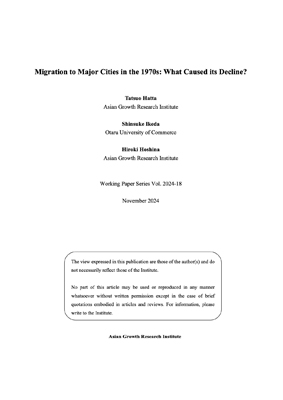Causes of the Sharp Decline in Migration to Major Metropolitan Areas in the 1970s

| Author | HATTA Tatsuo, IKEDA Shinsuke, HOSHINA Hiroki |
|---|---|
| Date of Publication | 2024.12 |
| No. | 2024-18 |
| Download | 2,445KB |
Contents Introduction
Japan's rapid growth in the 1960s was accompanied by a massive migration from rural to urban areas. However, immediately after 1970, migration declined sharply, and at the same time, the rate of economic growth plummeted. To explain this decline in urban-bound migration, we estimated the urban-bound migration function. The estimation reveals that in the 1970s, the largest factor contributing to the decline in this migration was the relative increase in per capita income in rural areas. The second most important factor was narrowing regional disparities in the job-to-application ratio. In addition, the relative increase in the stock of social capital in the local regions also contributed. However, the population change in the rural areas had negligible effects on urban-bound migration in the 1970s. This paper also demonstrates that the relative increase in per capita income in rural areas is largely due to policy-based regional redistribution, implying that the large-scale redistribution of the fruits of rapid economic growth to rural areas halted urban-bound migration and reduced the growth rate. This suggests that for developing countries experiencing high growth, curbing the political pressure to redistribute to rural areas may be important to sustain the growth.
